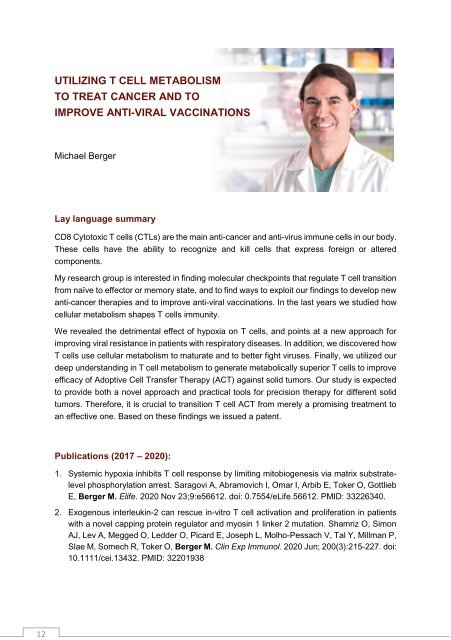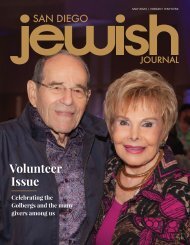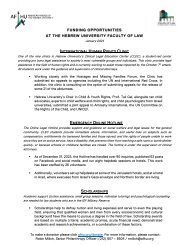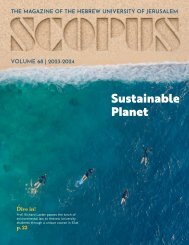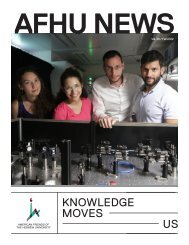Create successful ePaper yourself
Turn your PDF publications into a flip-book with our unique Google optimized e-Paper software.
UTILIZING T CELL METABOLISM<br />
TO TREAT CANCER AND TO<br />
IMPROVE ANTI-VIRAL VACCINATIONS<br />
Michael Berger<br />
Lay language summary<br />
CD8 Cytotoxic T cells (CTLs) are the main anti-cancer and anti-virus immune cells in our body.<br />
These cells have the ability to recognize and kill cells that express foreign or altered<br />
components.<br />
My research group is interested in finding molecular checkpoints that regulate T cell transition<br />
from naïve to effector or memory state, and to find ways to exploit our findings to develop new<br />
anti-cancer therapies and to improve anti-viral vaccinations. In the last years we studied how<br />
cellular metabolism shapes T cells immunity.<br />
We revealed the detrimental effect of hypoxia on T cells, and points at a new approach for<br />
improving viral resistance in patients with respiratory diseases. In addition, we discovered how<br />
T cells use cellular metabolism to maturate and to better fight viruses. Finally, we utilized our<br />
deep understanding in T cell metabolism to generate metabolically superior T cells to improve<br />
efficacy of Adoptive Cell Transfer Therapy (ACT) against solid tumors. Our study is expected<br />
to provide both a novel approach and practical tools for precision therapy for different solid<br />
tumors. Therefore, it is crucial to transition T cell ACT from merely a promising treatment to<br />
an effective one. Based on these findings we issued a patent.<br />
Publications (2017 – <strong>2020</strong>):<br />
1. Systemic hypoxia inhibits T cell response by limiting mitobiogenesis via matrix substratelevel<br />
phosphorylation arrest. Saragovi A, Abramovich I, Omar I, Arbib E, Toker O, Gottlieb<br />
E, Berger M. Elife. <strong>2020</strong> Nov 23;9:e56612. doi: 0.7554/eLife.56612. PMID: 33226340.<br />
2. Exogenous interleukin-2 can rescue in-vitro T cell activation and proliferation in patients<br />
with a novel capping protein regulator and myosin 1 linker 2 mutation. Shamriz O, Simon<br />
AJ, Lev A, Megged O, Ledder O, Picard E, Joseph L, Molho-Pessach V, Tal Y, Millman P,<br />
Slae M, Somech R, Toker O, Berger M. Clin Exp Immunol. <strong>2020</strong> Jun; 200(3):215-227. doi:<br />
10.1111/cei.13432. PMID: 32201938<br />
12


